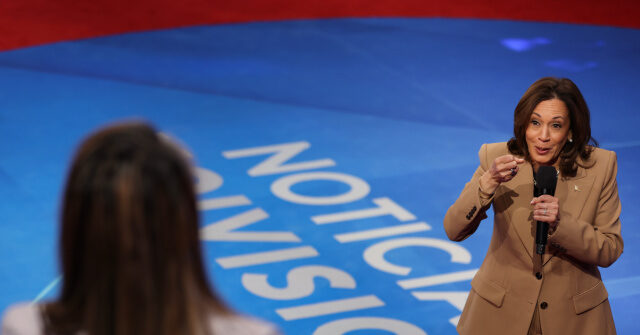During a recent town hall event hosted by Univision, Vice President Kamala Harris surprised many viewers by adopting a Spanish accent while responding to a question. This was a marked shift from her previous tendency to utilize a faux southern drawl, which she has employed on multiple occasions in various settings. The use of an accent has spurred concerns among critics regarding the authenticity of her persona, particularly as voters are increasingly sensitive to perceived inauthenticity in political figures. Harris’s attempt at a Spanish drawl during her response raised eyebrows and drew immediate backlash across social media platforms, with many users questioning her sincerity.
Critics, including prominent conservative voices like Andy Ngo and Greg Price, have pointed out this recurring theme of Harris’s accent changes. Her previous instances of adopting different regional accents have often overshadowed her political messaging. For instance, during a speech in Detroit aimed at auto workers in August, she utilized a manufactured southern accent, employing colloquialisms that seemed designed to resonate with her audience rather than reflecting her everyday vernacular. Her usage of phrases like “we gon’ do it again in 2024” not only illustrated her effort to connect with listeners but also brought forth skepticism about the authenticity of her speech.
Harris has a history of accent mimicry, dating back to her 2019 campaign events. In speeches, she has frequently adopted a southern drawl, punctuating her remarks with local flavor in an apparent attempt to build rapport with her audience. The consistent switch in her accent has led some to question her genuineness, as it appears that she adjusts her speaking style based on the demographic she is addressing. This practice can be perceived as part of a broader trend among politicians who strive to appear relatable to a diverse voter base, but it often raises alarms about their authenticity in the eyes of voters.
The issue of accent adoption extends beyond just regional variations. Harris faced criticism in 2021 when she was accused of employing a faux French accent during a visit to Paris. Such instances bolster a narrative that she engages in performative behavior to garner favor, whether domestically or abroad. Her comments, framed in overly stylized accents, detract from the substance of her message and leave room for doubt among voters about her genuine beliefs and values. The emerging consensus is clear: her accent switches may obscure her political points rather than enhance her connection with potential supporters.
The broader implications of Harris’s accent-switching behavior reflect a larger conversation in politics about authenticity and trust. In an age where information travels fast, and voters are more aware and critical than ever, the stakes for politicians who engage in perceived inauthentic behavior are high. As public figures, they must maintain a delicate balance between relatability and sincerity. Voters often seek out leaders who convey honesty and integrity, and any semblance of phoniness can lead to erosion of trust. In this respect, the scrutiny Harris faces serves as a reminder of the challenges politicians encounter in attempting to connect with diverse audiences.
Overall, Kamala Harris’s predicament highlights the precarious nature of political communication in a modern media landscape. The reception to her varying accents underscores the tension between striving for relatability and maintaining authenticity. As she continues to engage with different communities across the nation, navigating these perceptions will be essential to her political capital. Ultimately, the question remains whether her attempts to connect will resonate positively or hinder her standing among voters who demand genuineness from their leaders.

